|
|
|
Sort Order |
|
|
|
Items / Page
|
|
|
|
|
|
|
| Srl | Item |
| 1 |
ID:
148151
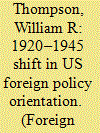

|
|
|
|
|
| Summary/Abstract |
Grand strategy change analyses exhibit problems in balancing the interaction among ideas, external structures and developments, and domestic politics. An alternative theory is constructed that combines the correspondence between external problems and capability, shocks, political entrepreneurship, domestic politics, and reinforcement. The essence of the theory is that strategic shifts are more probable and likely to persist to the extent that more of these components involve significant changes. The 1920–1945 system leader puzzle – why the United States abstained from ascending to the system leader position in 1920 but not in 1945 – is used as an illustration of the theory's explanatory utility.
|
|
|
|
|
|
|
|
|
|
|
|
|
|
|
|
| 2 |
ID:
097753
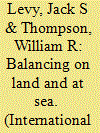

|
|
|
|
|
| Publication |
2010.
|
| Summary/Abstract |
Scholars often interpret balance of power theory to imply that great powers almost always balance against the leading power in the system, and they conclude that the absence of a counterbalancing coalition against the historically unprecedented power of the United States after the end of the Cold War is a puzzle for balance of power theory. They are wrong on both counts. Balance of power theory is not universally applicable. Its core propositions about balancing strategies and the absence of sustained hegemonies apply to the European system and perhaps to some other autonomous continental systems but not to the global maritime system. Sea powers are more interested in access to markets than in territorial aggrandizement against other great powers. Consequently, patterns of coalition formation have been different in the European system and in the global maritime system during the last five centuries. An empirical analysis demonstrates that counterhegemonic balancing is frequent in Europe but much less frequent in the global system. Higher concentrations of power in the global system lead to fewer and smaller rather than more frequent and larger balancing coalitions, as well as to more frequent and larger alliances with the leading sea power than against it.
|
|
|
|
|
|
|
|
|
|
|
|
|
|
|
|
| 3 |
ID:
068977


|
|
|
| 4 |
ID:
068088
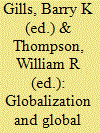

|
|
|
|
|
| Publication |
London, Routledge, 2006.
|
| Description |
xvii, 302p.
|
| Standard Number |
0415701368
|
|
|
|
|
|
|
|
|
|
|
|
Copies: C:1/I:0,R:0,Q:0
Circulation
| Accession# | Call# | Current Location | Status | Policy | Location |
| 050952 | 909/GIL 050952 | Main | On Shelf | General | |
|
|
|
|
| 5 |
ID:
069867
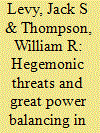

|
|
|
|
|
| Publication |
2005.
|
| Summary/Abstract |
The central proposition of balance-of-power theory (albeit one that has never been tested systematically) is that great powers balance against hegemonic threats. This article argues that this proposition applies to hegemonic concentrations of land-based military power in autonomous continental systems, but not necessarily to hegemonic concentrations of sea power in maritime systems. With a focus on continental systems, this article develops and tests several hypotheses linking military concentration, capability changes, and alliance responses for the European system from 1495 to 1999. Judging from existing data on army concentrations and a new database of great-power alliances since 1495, European great powers have demonstrated a strong propensity to balance when one state has acquired a third or more of the total military capabilities in the system, but not at lower concentrations of power; higher concentrations of power usually lead to larger balancing coalitions. Great powers do not always balance, however, so balancing is a probabilistic tendency rather than an "iron law" of behavior.
|
|
|
|
|
|
|
|
|
|
|
|
|
|
|
|
| 6 |
ID:
087352


|
|
|
|
|
| Publication |
2009.
|
| Summary/Abstract |
This article uses ITERATE data on international terrorism 1968-2004 to test Rapoport's wave-like behavior of modern terrorism. While the interpretation encompasses a much longer period of time than can be tested empirically with readily available data, it is possible to examine the past 3-4 decades of terrorist activity for traces of the coming and going of old and new groups. The article codes the type of group (anarchists, nationalists, leftists/Marxists, and religious fundamentalists) and then examines the type of tactics employed, deaths, and targets across time. The results confirm the presence of heterogeneous, wave-like behavior that conforms to the Rapoport interpretation as new and old groups/tactics/issues cycle in and out of activity.
|
|
|
|
|
|
|
|
|
|
|
|
|
|
|
|
| 7 |
ID:
062522


|
|
|
|
|
| Publication |
Hampshire, Palgrave Macmillan, 2005.
|
| Description |
xi, 271p.
|
| Series |
Evolutionary process in world politcs
|
| Standard Number |
1403968241
|
|
|
|
|
|
|
|
|
|
|
|
Copies: C:1/I:0,R:0,Q:0
Circulation
| Accession# | Call# | Current Location | Status | Policy | Location |
| 049728 | 327.172/RAS 049728 | Main | On Shelf | General | |
|
|
|
|
| 8 |
ID:
089376


|
|
|
|
|
| Publication |
Houndmills, Macmillan, 1988.
|
| Description |
xii, 380p.
|
| Standard Number |
0333429257
|
|
|
|
|
|
|
|
|
|
|
|
Copies: C:1/I:0,R:0,Q:0
Circulation
| Accession# | Call# | Current Location | Status | Policy | Location |
| 030112 | 359.03/MOD 030112 | Main | On Shelf | General | |
|
|
|
|
| 9 |
ID:
094625
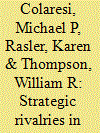

|
|
|
|
|
| Publication |
Cambridge, Cambridge University Press, 2007.
|
| Description |
xiv, 314p.
|
| Standard Number |
9780521707619
|
|
|
|
|
|
|
|
|
|
|
|
Copies: C:1/I:0,R:0,Q:0
Circulation
| Accession# | Call# | Current Location | Status | Policy | Location |
| 054832 | 327.1/COL 054832 | Main | On Shelf | General | |
|
|
|
|
| 10 |
ID:
071652
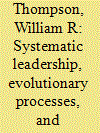

|
|
|
|
|
| Publication |
2006.
|
| Summary/Abstract |
Scholars disagree about the nature of the current international distribution of power and its implications for world politics. Is the current system unipolar, and, if so, is unipolarity likely to persist for very long? Fifteen generalizations about the structure of the international system are culled from the literature and addressed critically from a leadership long cycle point of view. Although the current system is militarily unipolar, it is not buttressed by a new wave of radical technological innovation that is critical to the operation of systemic leadership. Until or unless US military predominance is based on economic predominance, the effects of unipolarity are likely to be relatively weak and probably also short-lived.
|
|
|
|
|
|
|
|
|
|
|
|
|
|
|
|
| 11 |
ID:
083538


|
|
|
|
|
| Publication |
2008.
|
| Summary/Abstract |
The liberal formula for peace and prosperity in the 21st century involves substantial convergence in economic growth rates between the affluent North and the poor South, facilitating a decrease in the global North-South gap. This diminished developmental gap should lead to reduced conflict within the South and between the North and South. The problem is that long-term world economic growth is stimulated in part by intermittent upsurges in radical technology generated principally in the system's lead economy. These growth impulses diffuse outwards from the center of the North unevenly. We hypothesize that Northern economies are the primary beneficiaries of these periodic extensions of the technological frontier and that much less trickles down to the South. We test this question of uneven diffusion with time series data dating back to 1870 on systemic leadership growth, Northern economic growth, and Southern economic growth. We find that technological gains in the North have been more likely to expand the North-South gap than to close it. To the extent that the South and Southern turmoil are a function of uneven growth and stratification, neither is apt to disappear anytime soon.
|
|
|
|
|
|
|
|
|
|
|
|
|
|
|
|
| 12 |
ID:
060833


|
|
|
|
|
| Publication |
London, Unwin Hyman, 1989.
|
| Description |
v 2 (xvii, 253p.)
|
| Contents |
V.2: Studies in International conflict
|
| Standard Number |
0044450974
|
|
|
|
|
|
|
|
|
|
|
|
Copies: C:1/I:0,R:0,Q:0
Circulation
| Accession# | Call# | Current Location | Status | Policy | Location |
| 030889 | 355.02/RAS 030889 | Main | On Shelf | General | |
|
|
|
|
| 13 |
ID:
115304
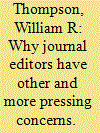

|
|
|
| 14 |
ID:
050361


|
|
|
|
|
|
|
|